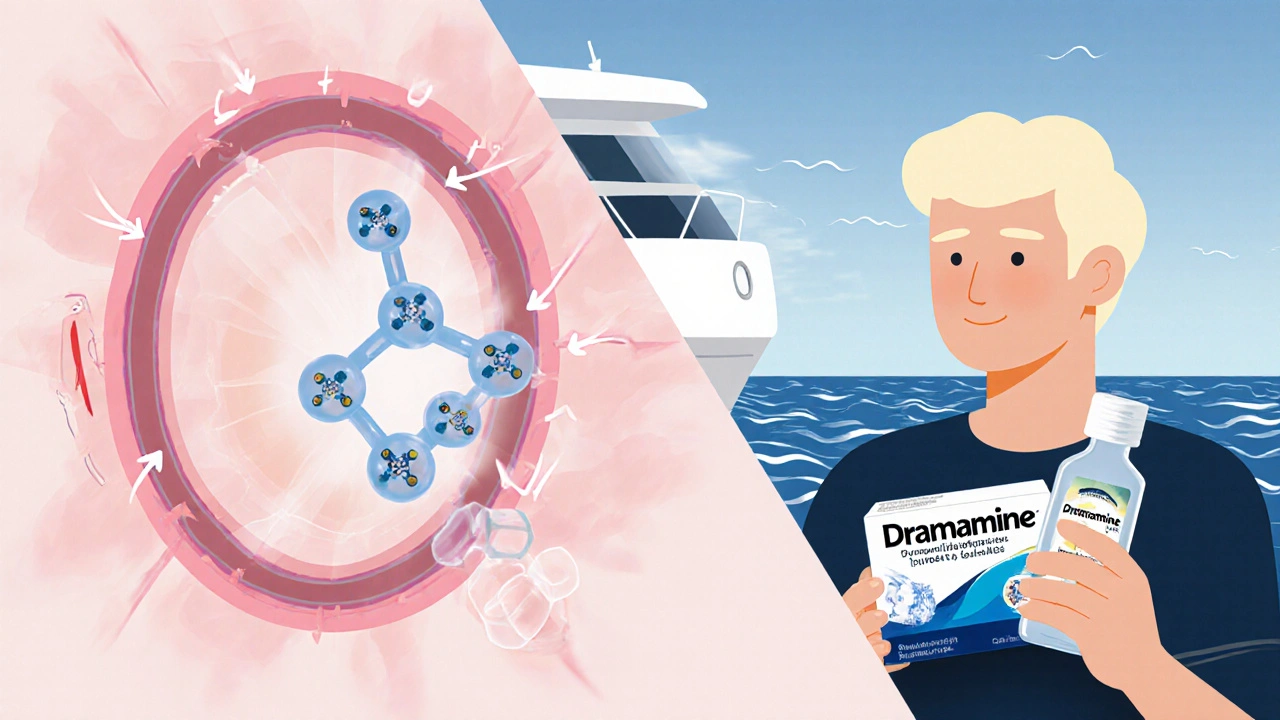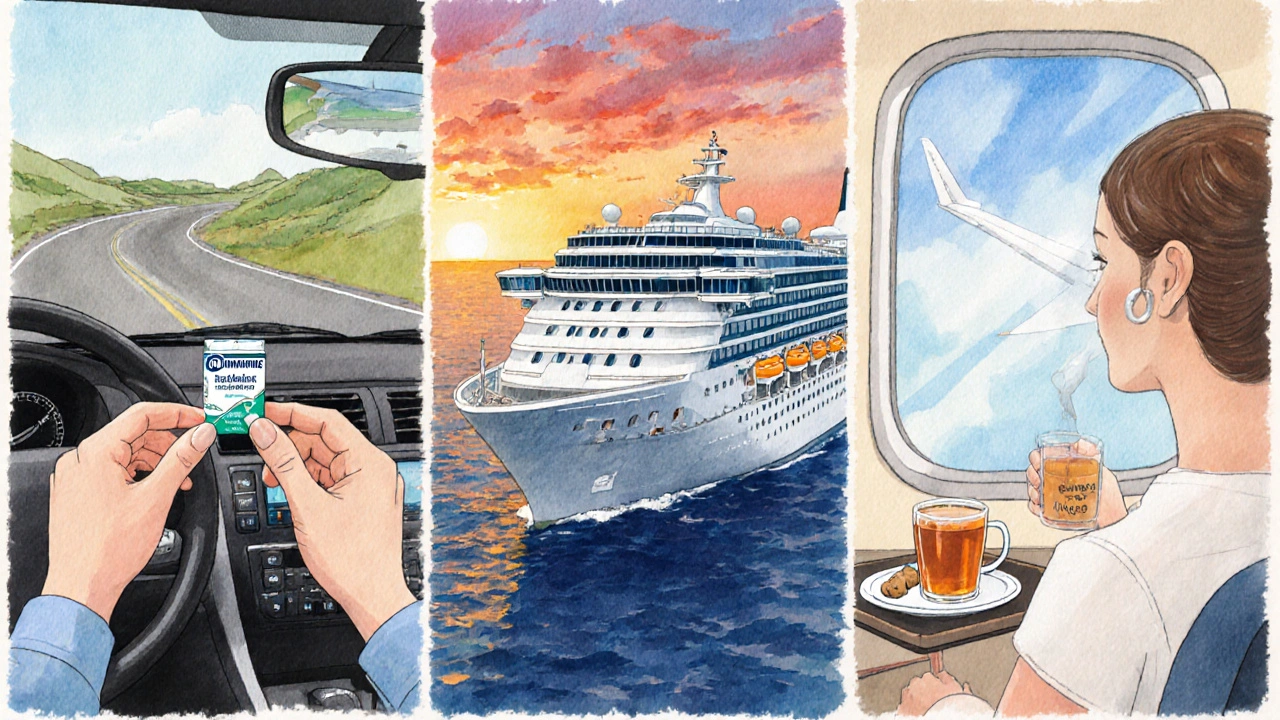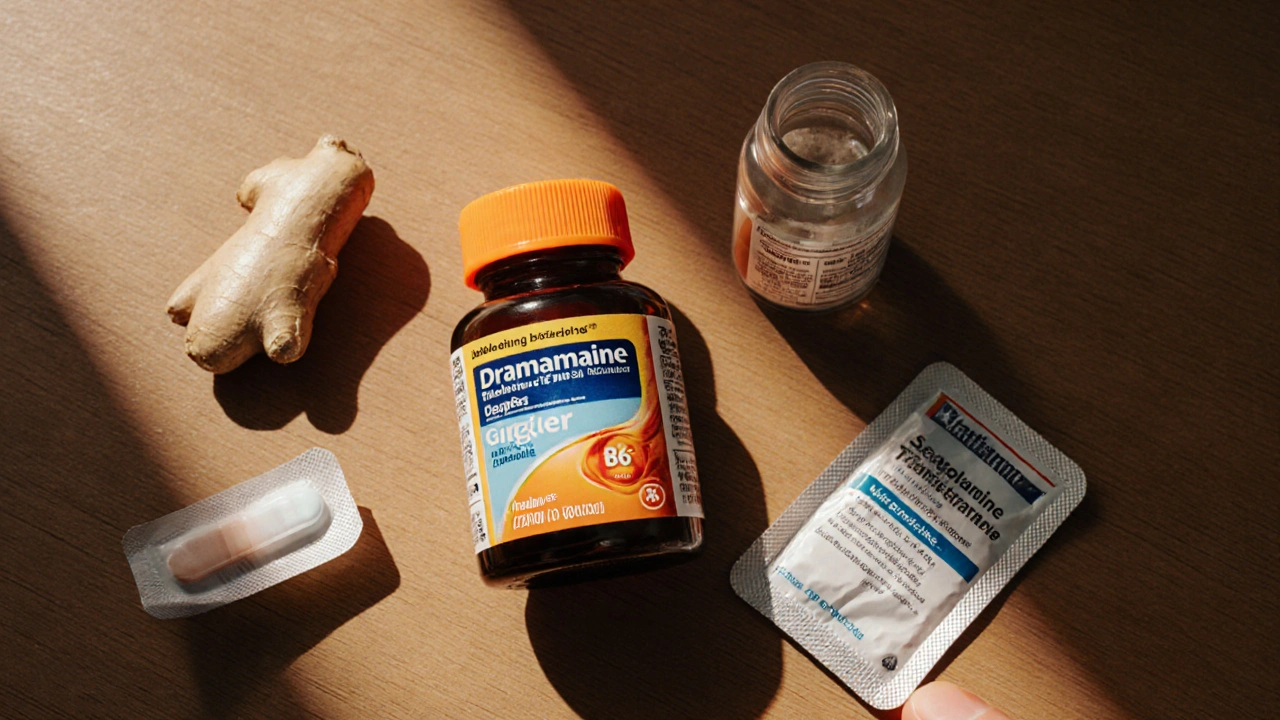- 20
Key Takeaways
- Dramamine (dimenhydrinate) works fast but often causes drowsiness.
- Meclizine (Bonine) and cyclizine (Marezine) are less sedating options for longer trips.
- Scopolamine patches provide up to 72hours of relief without oral dosing.
- Natural alternatives like ginger and vitaminB6 help mild symptoms with few side effects.
- Choose based on travel length, age, desired alertness, and any medical conditions.
What is Dramamine?
When you think of motion‑sickness relief, Dramamine is the name most people recognize. Dimenhydrinate is the active ingredient behind the brand. It belongs to the antihistamine family and works by blocking histamine receptors in the brain that trigger nausea and vomiting. First introduced in the 1940s, it remains a staple in many travel first‑aid kits.
How Dimenhydrinate Works
Dimenhydrinate combines an antihistamine (diphenhydramine) with a mild anticholinergic (dimenhydrinic acid). This dual action reduces the vestibular system’s over‑reaction to motion, calming the signals that tell your stomach it’s time to empty. The typical adult dose (50mg) starts acting within 15-30minutes, peaks at about an hour, and lasts 4-6hours.
Popular Alternatives to Consider
Not everyone tolerates dimenhydrinate well. Below are the most common over‑the‑counter and prescription‑level options that people compare against it.
- Meclizine (brand name Bonine) - a piperazine antihistamine with a slower onset but a longer 24‑hour duration and lower sedation.
- Cyclizine (brand name Marezine) - similar to meclizine, often favored for sea travel because it stays effective for up to 12hours.
- Scopolamine (transdermal patch, brand name Transderm Scop) - a prescription‑only anticholinergic patch that delivers medication through the skin for up to three days.
- Diphenhydramine (brand name Benadryl) - another antihistamine that works fast but is highly sedating.
- Ginger - a natural root that can be taken as capsules, tea, or chewable forms. It reduces nausea by influencing gastrointestinal receptors.
- VitaminB6 (pyridoxine) - often used by pregnant travellers; it supports neurotransmitter balance and may lessen motion‑induced nausea.

Comparison Table
| Medicine / Remedy | Type | Typical Dose & Administration | Onset | Duration | Main Side Effects | Average Cost (US$) per treatment |
|---|---|---|---|---|---|---|
| Dimenhydrinate | Antihistamine | 50mg oral tablet, repeat every 4-6h | 15‑30min | 4‑6h | Drowsiness, dry mouth, blurred vision | 0.30-0.50 |
| Meclizine | Antihistamine (piperazine) | 25mg oral tablet, once daily | 1‑2h | 24h | Mild drowsiness, headache | 0.40-0.60 |
| Cyclizine | Antihistamine | 50mg oral tablet, every 8‑12h | 30‑60min | 12h | Drowsiness, constipation | 0.35-0.55 |
| Scopolamine | Anticholinergic patch | 1.5mg patch applied behind ear, lasts 72h | 1‑4h | Up to 72h | Dry mouth, vision blur, possible confusion | 5.00-7.00 |
| Ginger (capsule) | Natural supplement | 250mg capsule, 30min before travel | 30‑45min | 4‑6h | Heartburn, mild mouth irritation | 0.20-0.40 |
| VitaminB6 (pyridoxine) | Vitamin supplement | 10-25mg oral, daily before travel | 1‑2h | Variable (depends on intake) | Rare, high doses may cause neuropathy | 0.10-0.25 |
How to Choose the Right Option
Picking a remedy isn’t a one‑size‑fits‑all decision. Use these questions to zero in on what matters most for you.
- How long is your trip? For a day‑long road trip, a single dose of dimenhydrinate or ginger may be enough. For a week‑long cruise, a 24‑hour meclizine tablet or a scopolamine patch cuts down on re‑dosing.
- Do you need to stay alert? If you’ll be driving or need to operate machinery, avoid highly sedating options like dimenhydrinate or diphenhydramine. Meclizine and cyclizine are milder, while scopolamine has minimal sedation for most users.
- Any health concerns? Pregnant travelers should steer clear of strong antihistamines and consider ginger or vitaminB6. People with glaucoma, enlarged prostate, or certain heart conditions should avoid anticholinergics such as scopolamine.
- Age of the user? Children under 2years should not receive dimenhydrinate. For kids 6‑12years, lower‑dose meclizine or a child‑friendly ginger chew can work.
- Cost sensitivity? Generic dimenhydrinate and ginger are the cheapest. Scopolamine patches are pricier but may save money on multiple trips.
Pros and Cons of Dimenhydrinate vs Each Alternative
Dimenhydrinate vs Meclizine
Dimenhydrinate kicks in fast, which is great if you feel sick right away. The downside is the 4‑hour window and noticeable drowsiness. Meclizine takes a bit longer but lasts a full day and usually leaves you more awake. If you’re on a multi‑day road trip and need to stay functional, meclizine often wins.
Dimenhydrinate vs Cyclizine
Both are antihistamines, but cyclizine’s 12‑hour coverage fits a typical sea‑day schedule better than dimenhydrinate’s short burst. Cyclizine also tends to cause less dry‑mouth dryness, though some people report constipation.
Dimenhydrinate vs Scopolamine Patch
Scopolamine is a game‑changer for long cruises or flights because the patch lasts up to three days without you remembering to take pills. However, it’s prescription‑only in many countries and can cause blurry vision. Dimenhydrinate remains the easy‑to‑buy, OTC starter.
Dimenhydrinate vs Diphenhydramine
Diphenhydramine (Benadryl) is essentially the same antihistamine component without the dimenhydrinic acid. It works just as fast but is even more sedating, making it a poor choice if you need to stay alert.
Dimenhydrinate vs Ginger
Ginger is low‑risk and works well for mild nausea. It won’t knock you out, but it also isn’t as potent for severe motion sickness. Pairing a ginger capsule with a half‑dose of dimenhydrinate can give you fast relief without heavy sedation.
Dimenhydrinate vs VitaminB6
VitaminB6 is safe for most users, especially pregnant travelers, but its effect size is modest. It’s best as a preventive supplement rather than an emergency rescue.

Safety Tips and Interactions
Regardless of which product you pick, keep these safety pointers top of mind.
- Never exceed the recommended daily dose. Over‑use can lead to anticholinergic toxicity - symptoms include confusion, rapid heart rate, and urinary retention.
- Avoid alcohol while taking any antihistamine; the combination amplifies drowsiness.
- Check with your doctor if you’re on other sedatives, antidepressants, or blood pressure meds.
- Store all medicines out of reach of children. Dimenhydrinate tablets can look like candy.
- If you experience severe side effects (e.g., vision problems, hallucinations), seek medical help immediately.
Frequently Asked Questions
Can I take Dimenhydrinate and Meclizine together?
Combining two antihistamines increases the risk of excessive drowsiness and anticholinergic side effects. It’s generally not recommended unless a doctor specifically advises a staggered approach.
Is the Scopolamine patch safe for children?
The patch is approved for users 12years and older in most regions. For younger children, OTC antihistamines at age‑appropriate doses or ginger are safer choices.
How long before travel should I take Dimenhydrinate?
Take the tablet 30minutes before you start moving. If you’re on a long drive, a second dose can be taken after 4hours, but never exceed eight tablets in 24hours.
Can I use ginger if I’m already on antihistamines?
Yes-ginger has a different mechanism and generally does not interact with antihistamines. It can be a helpful add‑on to reduce the total antihistamine dose needed.
What should I do if I feel extremely drowsy after taking Dimenhydrinate?
Stop any additional doses, drink water, and avoid driving. Rest in a safe place until the drowsiness wears off-usually within a few hours. If it persists, contact a healthcare professional.
Next Steps
Now that you have the side‑by‑side facts, pick the option that matches your travel plan:
- Short day trips? Dramamine or ginger works well.
- Multi‑day cruises? Try a scopolamine patch or meclizine.
- Need to stay awake for work or driving? Favor meclizine, cyclizine, or ginger.
- Pregnant or nursing? Stick with ginger or vitaminB6 after checking with your doctor.
Remember to read the label, respect dosage limits, and store medicines safely. Safe travels!


Lauren Ulm
October 13, 2025 AT 17:29If big pharma wants you drowsy, they’ve designed Dramamine to keep you compliant 😂
Michael Mendelson
October 14, 2025 AT 10:09Honestly, the average traveler doesn’t even understand the pharmacological nuance between dimenhydrinate and meclizine. It’s a classic case of the market pushing the cheap sedative because it sells more copies. You’d think a sophisticated consumer would demand a non‑drowsy alternative, but they’re content with a nap.
Ibrahim Lawan
October 15, 2025 AT 02:49When you consider the mechanism of action, dimenhydrinate essentially dampens the vestibular overstimulation that triggers nausea. For brief road trips, that rapid onset can be a real asset. Yet, if your journey spans several days, the cumulative sedative load may impair your performance. Evaluating the trade‑off between speed and alertness is a wise practice. Choose what aligns with your personal resilience and itinerary.
Gabrielle Vézina
October 15, 2025 AT 19:29While the table claims scopolamine is superior for multi‑day voyages, its anticholinergic side‑effects can be disastrous for anyone with pre‑existing ocular pressure-an aspect the authors conveniently omit.
carl wadsworth
October 16, 2025 AT 12:09Look, folks – if you’re driving a truck across state lines, you cannot afford to be knocked out by Dramamine. Opt for meclizine or cyclizine; they give you the edge without the fog. For those who need a hands‑free solution, the patch is a game‑changer, but only if you’re cleared by a physician. Remember, safety first, and never self‑medicate beyond recommended doses.
Leah Robinson
October 17, 2025 AT 04:49Ginger is such a gentle option 🌿 – perfect for a quick cruise when you don’t want to feel groggy. Pair it with a half‑dose of Dramamine and you get fast relief without the heavy sleep.
Jonny Arruda
October 17, 2025 AT 21:29Dramamine works fast but makes you sleepy; meclizine lasts longer with less drowsiness.
Melissa Young
October 18, 2025 AT 14:09Our troops need clear heads on the move, so we ditch the sedating OTC meds and roll out meclizine across the fleet – it’s the only protocol that keeps the front line alert.
SHASHIKANT YADAV
October 19, 2025 AT 06:49Is it true that scopolamine patches can stay effective for up to 72 hours? 🤔 That could simplify long‑haul flights without the hassle of repeated pills.
Jami Johnson
October 19, 2025 AT 23:29From a clinical perspective, the anticholinergic burden of dimenhydrinate should not be ignored. Its rapid onset is undeniably useful for sudden nausea, yet the central nervous system depression it induces can compromise cognitive function, especially in older adults. By contrast, meclizine’s slower absorption yields a steadier plasma concentration, minimizing peak‑related sedation. Cyclizine occupies a middle ground, offering a 12‑hour window with tolerable side‑effects for most patients. When prescribing, consider renal and hepatic function, as these organ systems metabolize the antihistamines differently, influencing both efficacy and safety. Finally, never overlook non‑pharmacologic measures such as hydration, positioning, and visual fixation, which synergize with medication to reduce vestibular mismatch.
Kasey Krug
October 20, 2025 AT 16:09These tables are just marketing fluff; the price differences are negligible compared to the actual effectiveness.
jake cole
October 21, 2025 AT 08:49The so‑called “natural” ginger is a weak excuse for people who can’t afford proper medication, and it does nothing for serious seasickness.
Natalie Goldswain
October 22, 2025 AT 01:29Travelers from different cultures often rely on herbal teas, which can be a pleasant adjunct to OTC meds.
khajohnsak Mankit
October 22, 2025 AT 18:09Imagine the inner ear as a rebellious orchestra, and these drugs are the conductor trying to keep the music in harmony; some conductors wave a baton, others just whisper.
Jayant Paliwal
October 23, 2025 AT 10:49When evaluating motion‑sickness countermeasures, it is essential to adopt a holistic framework that integrates pharmacodynamics, patient demographics, and situational variables. First, the speed of onset directly influences user satisfaction; a drug that begins working within fifteen minutes aligns with the acute nature of nausea spikes. Second, the duration of action must be matched to the itinerary length; a four‑hour window may suffice for a short drive but is inadequate for multi‑day voyages. Third, side‑effect profiles such as sedation, dry mouth, or visual disturbances can impair functional capacity, especially for operators of heavy machinery. Fourth, cost considerations remain paramount in low‑resource settings where the $0.30 per tablet advantage of dimenhydrinate becomes decisive. Fifth, contraindications, including glaucoma, prostatic hypertrophy, and pregnancy, narrow the therapeutic window for anticholinergics. Sixth, the route of administration-oral versus transdermal-affects compliance; patches eliminate the need for repeated dosing but introduce skin irritation risks. Seventh, the psychosocial perception of “natural” remedies like ginger can enhance placebo effects, thereby augmenting efficacy. Eighth, regulatory status determines accessibility; prescription‑only scopolamine patches may be unavailable in certain regions, forcing reliance on OTC options. Ninth, drug‑drug interactions, particularly with sedatives or antihypertensives, necessitate thorough medication reconciliation. Tenth, patient preference regarding alertness versus drowsiness should guide the selection process. Eleventh, age‑specific dosing guidelines ensure safety for pediatric and geriatric populations. Twelfth, the metabolic pathways involving CYP450 enzymes can alter plasma concentrations, leading to variability in response. Thirteenth, post‑marketing surveillance data occasionally reveal rare adverse events not captured in clinical trials. Fourteenth, educational interventions on proper dosing intervals mitigate the risk of anticholinergic toxicity. Finally, a personalized regimen that weighs all these factors will yield the most optimal outcome for the traveler.
Kamal ALGhafri
October 24, 2025 AT 03:29Jayant outlines a solid checklist; the only addition I’d stress is the importance of reviewing a patient’s current antihistamine load to avoid cumulative anticholinergic burden.
Gulam Ahmed Khan
October 24, 2025 AT 20:09Great points! Let’s remember that staying hydrated and getting fresh air are simple tricks that work alongside any medication 😊
John and Maria Cristina Varano
October 25, 2025 AT 12:49These meds are same everywhere, but American brands push the cheapest dramamine – don’t be fooled.
Melissa Trebouhansingh
October 26, 2025 AT 04:29While Kamal’s observation is not without merit, one must also contemplate the epistemological underpinnings of our reliance on pharmaceutical heuristics; the sociocultural narrative that elevates synthetic agents over herbal adjuncts is a construct that merits deconstruction.
carol messum
October 26, 2025 AT 21:09In plain terms, we should balance meds and nature, not let one dominate the conversation.